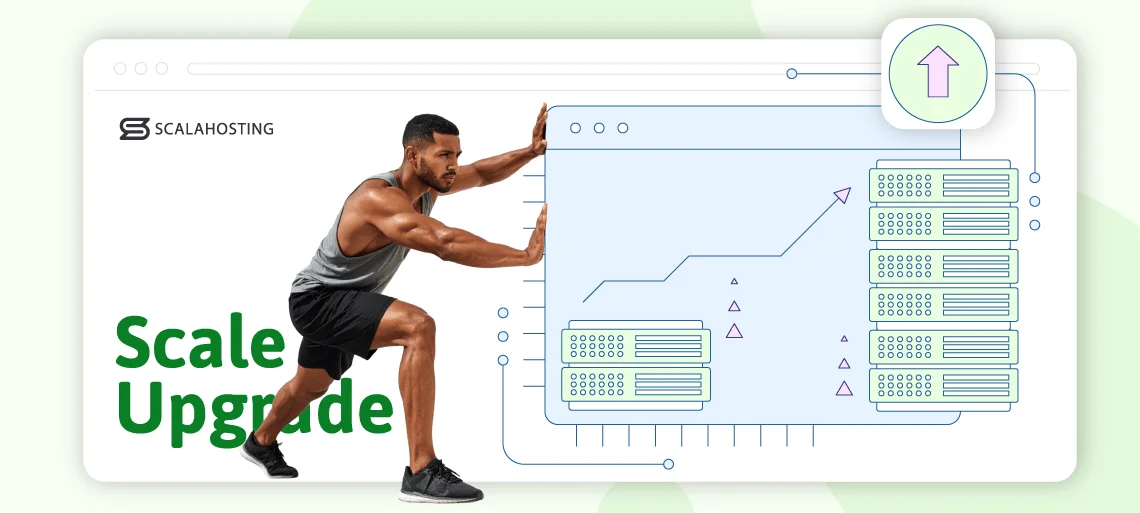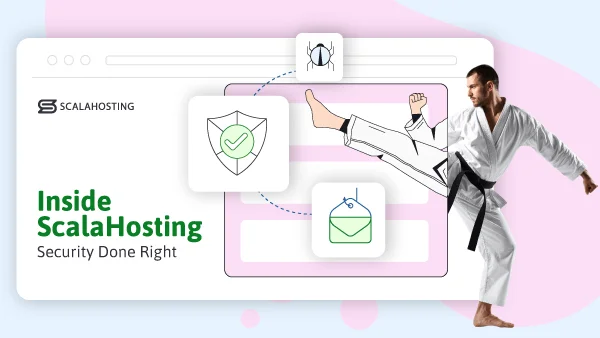Inside ScalaHosting: Shared Hosting Limitations & Abuse Policies
Shared hosting has long been the entry point for websites, but that comes with its trade-offs. To keep costs low and servers stable, most providers enforce tight limitations – on inodes, CPU usage, memory, and concurrent processes – along with strict abuse policies. For startup businesses and growing agencies, these constraints have a negative impact on performance, scalability, and flexibility.
ScalaHosting takes a different approach.
While we acknowledge the technical necessity of resource boundaries in shared environments, we redefine how those limits are applied. Generous thresholds, more transparent enforcement, and infrastructure that minimizes the typical downsides of shared hosting are just some of our unique value propositions.
Here is how we do it!
Shared Hosting Limitations and the Overselling Problem

Shared hosting is the cheapest form of hosting services – for just a few dollars per month, any user can secure an account to build a website. But how do hosts manage to achieve that?
Quite easy, really – by overselling servers!
The underlying idea of the service is that many customers will share the server resources. By maximizing the number of users, providers are able to make a profit, even with the cheap rates per account. But many do that to a threatening extent, by cramming thousands of clients on a single physical machine and draining its CPU, RAM, and disk space to the maximum.
Take RAM, for example.
Shared providers will seemingly have no limitation on your memory consumption. The idea is that a single user can rarely utilize their portion of RAM, so why not make it a free-for-all? Whoever needs more resources at a certain point can get them, thus keeping their operations smooth.
Sounds great, right? Sure, but not if you are a server “neighbor” with such users.
Bad neighbors can cause all kinds of trouble, including slower run speeds, downtimes, increased bounce rates, and negative SEO impact. Your account security can also be compromised.
So, how do hosting providers tackle the overselling issues?
By imposing limits. Lots of limits, often well-hidden inside their Terms of Service. Think of things like restricted number of inodes, concurrent connections, type of files you can store, and many more.
Heavy limitations and oversold servers are never good news in the world of web hosting. Here are just a few ways how they can affect each shared user.
Negative Impacts of Shared Hosting Limitations
- Slower performance – sharing resources with 2,000+ other people without any account isolation means you are counting on sheer luck that other users won’t hog the server CPU and RAM and negatively affect your site performance.
- Frequent downtimes – if your processes are executed too slowly, this can easily lead to service interruptions. Downtimes are one of the worst things that can happen to any website, bringing all kinds of associated issues.
- Inability to handle growth – the aim of almost any online project is to grow and attract a wider audience. Such growth is severely limited on a shared account, as you cannot just add certain resources without upgrading your entire account.
- Significant revenue loss – if you are looking to sell products/services, you’d better forget about shared hosting. Any downtimes or slow performance for ecommerce websites result in lost sales and increased bounce rates. No serious business should compromise its smooth operation just to save a few dollars per month.
- Loss of customer trust – clients are getting more and more demanding, so you can’t compromise the user experience. If your website takes too long to load, the potential customer will just leave, never to return again. This rings even more true if the slowdown is on the checkout page.
- Poor SEO rankings – Google loves fast websites and secure websites, and checks a ton of signals to confirm the site’s reliability. Shared hosting rings all kinds of alarms that can easily bring your pages down the ranks.
- IP reputation risks – shared hosting clients also utilize the same IP address. Bad neighbors play a huge role here as your services (especially emails) can can quickly go downhill if your IP falls into a blacklist.
- Arbitrary account suspensions – providers are well aware of how certain clients can hog the resources on a shared server, so they impose strict limitations – on inodes, connections, types of files, emails, etc. Many of these restrictions are hidden, and when you learn about them – it’s often once your account gets suspended and your services go offline.
- Inconsistent security – another way you can suffer from your server neighbors is when they are too lenient with their security measures. A single compromised account means that all other users on the same server are now in danger.
All that sounds scary, but it doesn’t have to be. Because shared hosting can be done better…
The ScalaHosting Way: How We Handle Shared Hosting
To make shared hosting better, the Scala Team is well aware that 2,000 people on the same server is a big no-no, regardless of how small their needs are. This is why we accommodate significantly fewer users on the same machine, often 10 times fewer than other hosting providers. This gives us leeway and allows us to secure enough resources for each project to flourish without having to worry about what other accounts are doing.
If your project starts consuming more resources than usual, we don’t just suspend it on the spot. We realize that traffic spikes tend to happen, and we don’t want you to experience downtimes because you gained more popularity.
After all, this is what every website owner is after.
This is why we cover the initial seven days of high resource usage. Once your account starts draining twice your allocated CPU/RAM for more than seven consecutive days, we will still not suspend your account but send you a notification. It will contain information about the issue and possible ways to resolve it. The high traffic may be genuine, but it may also be a result of a faulty plugin or bad coding.
If no action is taken for 7 more days (that makes 15 days in total), only then will we limit the account’s allowed PHP-FPM processes to mitigate the effects of the overusage.
Note that at no point will we suspend your account. The only thing we do is slow down the incoming requests so no other users can be affected.
This is what transparency and clear communication are all about.
Oh, and did we mention the inode limits? Those pesky restrictions that hinder the growth of websites that utilize a large number of files? Yeah, there are no such things with ScalaHosting!
Key Differences in ScalaHosting’s Shared Hosting Model
- Lower client-per-server density
- Clear and timely abuse communication
- No account suspensions for high usage
- No inode limits
How Can You Scale and Upgrade Shared Services?

Shared Hosting and scalability are not a good pair. If you only need to increase your RAM, for example, you cannot do it without upgrading the entire package, getting more CPU, disk space, and other resources. Not to mention the price hike…
There is no such problem on a cloud VPS.
In fact, this hosting service solves every shared hosting limitation problem we discussed so far:
- Account isolation – each client on a VPS service gets their own personal space, and no one can interfere with it. Even a potential breach in the physical server will not grant the attacker access to your virtual machine..
- Dedicated resources – many providers use OpenVZ as a virtualization solution. This still leaves the door open for resource overselling, as not all accounts will utilize their CPU/RAM to the maximum. This is impossible with ScalaHosting and our KVM virtualization guarantees you get exactly what you paid for, regardless of whether you use it or not.
- Hardened security – the account isolation also affects security in a positive way. You are no longer reliant on the security measures of your server neighbors and can easily protect your online premises by following industry recommendations.
- True scalability – a virtual private server allows you to add only the resources you need, without upgrading your entire account or moving to a different machine. Not only that, but the cloud environment gives you access to a nearly limitless amount of resources.
- Optimal performance – as you are not affected by the traffic usage of your neighbors, you can put your efforts into maximizing your loading speeds without outside factors weighing in. Perfect for any type of business that aims to get more online exposure.
Final Takes
While shared hosting remains a cost-effective starting point, its limitations—resource caps, strict abuse policies, and limited control—can quickly become roadblocks for growing sites or serious projects. While ScalaHosting actively tackles those obstacles, a managed VPS offers a powerful alternative, combining dedicated resources, enhanced performance, and full root access with the ease of hands-off server management. For businesses ready to scale without compromising security or flexibility, upgrading to a managed VPS is the next logical step.


